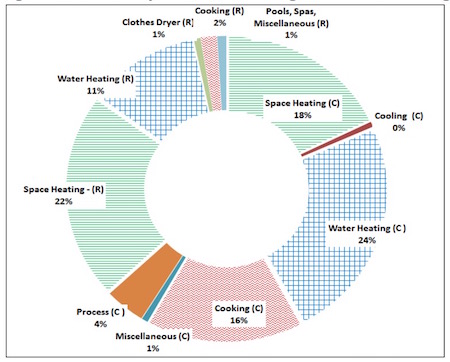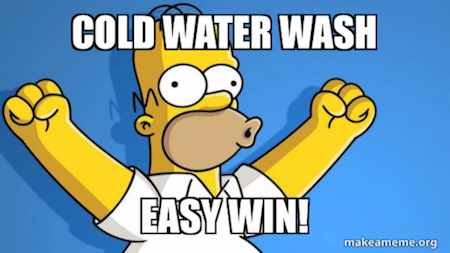First, some background. If you look at the greenhouse gas emissions that come from the mid-peninsula, most come from transportation, but a big chunk also comes from natural gas use. This chart is for the City of Palo Alto, but I expect nearby cities like Mountain View and Menlo Park are similar. (1)

2018 Palo Alto greenhouse-gas emissions (source: Appx B of the 2019 Earth Day Report)
The natural gas we residents use is largely for space and water heating, with about two-thirds used for space heating and one-third for water heating (see residential uses marked with (R) below).

Natural gas use in Palo Alto buildings (source: page 25 of Palo Alto’s 2016 S/CAP)
Unfortunately, our per capita gas use is going up rather than down in recent years. This must go down, and soon, if we are to avoid the worst impacts of global warming. How do we do that?

Palo Alto’s per capita utility consumption, in therms (source: 2019 Earth Day Report)
The two main ways to reduce our home gas use are (a) install heaters that use less gas (e.g., heat pumps) and (b) use less heat. Installing heat pumps is not quite “easy” yet, and it typically requires significant up front investment. Switching to heat pumps is important, but not the topic for today. On the other hand, “use less heat” is something we can all do today. I’m not advocating cold showers, though! For this post, I want to talk laundry.

I like emissions savings that I can implement and forget about. Cold-water washing has been one of those for our household. I’ve always washed with warm or hot water because I remembered learning that it cleans better. But it turns out there are detergents formulated specifically for cold-water washing, and one of them (Tide) gets very high marks. So I switched about a year ago, and we haven’t looked back, even with a teen in the house! We don’t notice the difference, and a nice side-effect is that it’s easier on the clothes.

According to one article I read, only 37% of laundry loads in the US are run with cold water. I highly encourage you to try out cold-water washing if you are washing with warm or hot water.
This would be a short and sweet blog post except it occurred to me that this is a great opportunity to talk about how complicated emissions-lite shopping can be. Here is a concrete example, followed by some tips.
The bottle of detergent shown above is very big and plastic. Tide promises only that 25% is from recycled materials. And the bottle is awfully heavy. Doesn’t that require a lot of emissions to package and transport? Would powder be better? But powder doesn’t work well in cold water. What about a brand that is formulated with environmental concerns in mind? The cold-water detergent in the review I cited above (ECover Zero) doesn’t seem to get things very clean, at least according to that reviewer. So I thought I’d troll the aisles at nearby stores to see what I could find. It turns out there is a huge selection of “eco detergents” at Target, but none of them is formulated for cold water.

“Eco-friendly” detergent selection at Target in Mountain View
I read some labels but didn’t understand what I was reading, so decided to keep looking. I headed over to Whole Foods next since it is near the Target. They had a smaller selection of detergents, but again no cold-water option. However, I saw something interesting and left the store with a “free & clear” detergent in a pressed cardboard bottle.

Which is the better option? I have no idea. How do you compare an “eco-friendly” detergent for warm water with a less “eco-friendly” detergent made for cold water? (2)
On the plus side, the Seventh Generation detergent is reported to clean pretty well. A 2017 USA Today review says “In our testing, the company's Free and Clear detergent provided a comparable clean to conventional detergents.” It also comes out well in this more recent review of eco-friendly detergents, ranking first overall and third in terms of cleaning, only slightly below the top choice.
The Seventh Generation packaging is objectively better than Tide. Made of 70% recycled cardboard and 30% recycled newspaper, with a plastic liner, it closes the recycling loop and uses only one-third the plastic of the Tide bottle. Just as important, the detergent is concentrated, so this bottle cleans 66 loads with only 50 fl oz of detergent. The Tide bottle, on the other hand, cleans 59 loads with 92 fl oz of detergent. Seventh Generation ships half the product for the same use. It also uses more biodegradable and fewer petroleum-based ingredients.
But it’s not a cold water detergent. Which detergent is best? The emissions math here is beyond me. A meaningful price on carbon would help -- at least some of this would be reflected in the detergent's cost. Short of that, here are some tips:
- “Better” is fine. Don’t worry about finding the best option, if that even exists. If you are washing in warm or hot water with a standard detergent, either one of these is an emissions improvement and will do the job. Make the switch, pat yourself on the back, and move on to the next thing.
- Don’t over-use detergent. It is easy to use too much detergent, but it doesn’t get your clothes cleaner and in fact can make them dirtier since the bubbles can deposit dirt back onto the clothes. Right-sizing your detergent use means less overall impact.
- Do less laundry. Aren’t those magical words? If you can find ways to wash (and dry) less often, you will save yourself time while reducing your impact on the planet. If you do this, it matters even less which detergent you buy, and your clothes last longer.
As with so many other things when it comes to climate change, there is no “right way” to do laundry, but there are plenty of better ways. Make an improvement that works for you, stick with it, then look for something else to change. Laundry is not the most important change you can make (3), but it is something, and it is very doable, so give it a shot and notch an easy win.
Notes and References
1. It’s important to understand that we are responsible for many emissions that don’t happen right here in our cities. For example, our diet and air travel are substantial contributors to global warming, but they are not accounted for by our cities because the emissions do not occur right here. See this early blog post for a better understanding of emissions that we are responsible for, even when they occur elsewhere. These are often referred to as “consumption-based emissions”.
2. I don’t know which aspects of “eco-friendly” are most meaningful. According to USA Today, for example, “the harvesting and processing of some plant-based ingredients has a greater overall carbon footprint than traditional, petroleum-derived alternatives.” So for the purposes of this post, I focus mostly on packaging.
3. Yes, that is getting out of your gas-powered car (or carpooling). After that: eating less beef, flying less, and using less gas for heat. I cannot wait for this world of cleaner air, quieter skies, healthier people, and more efficient buildings!
4. You can find a review of many other “eco-friendly” laundry detergents here.
5. Consumer Reports suggests it is still a good idea to use hot water in some cases. “When a family member is sick, use hot water mixed with chlorine bleach to reduce bacteria in the bed linens and towels. The same goes for cleaning dirty cloth diapers, or other messes.”
Current Climate Data (August 2019)
Global impacts, US impacts, CO2 metric, Climate dashboard (updated annually)
Comment Guidelines
I hope that your contributions will be an important part of this blog. To keep the discussion productive, please adhere to these guidelines, or your comment may be moderated:
- Avoid disrespectful, disparaging, snide, angry, or ad hominem comments.
- Stay fact-based, and provide references (esp links) as helpful.
- Stay on topic.
- In general, maintain this as a welcoming space for all readers.



